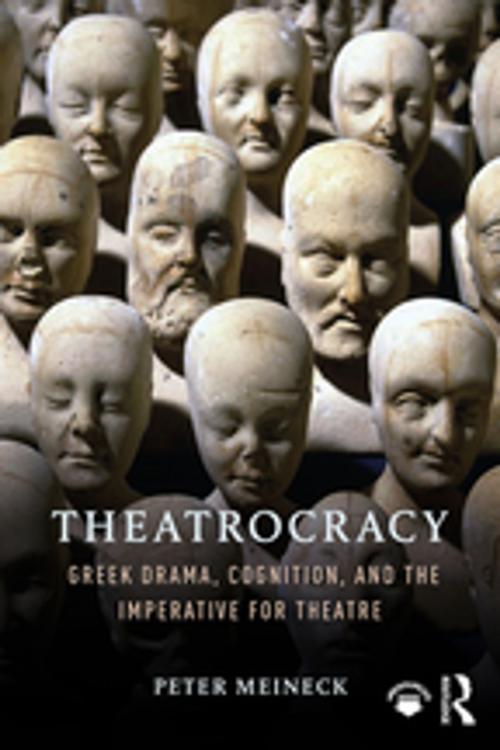Theatrocracy
Greek Drama, Cognition, and the Imperative for Theatre
Nonfiction, History, Ancient History| Author: | Peter Meineck | ISBN: | 9781315466552 |
| Publisher: | Taylor and Francis | Publication: | July 14, 2017 |
| Imprint: | Routledge | Language: | English |
| Author: | Peter Meineck |
| ISBN: | 9781315466552 |
| Publisher: | Taylor and Francis |
| Publication: | July 14, 2017 |
| Imprint: | Routledge |
| Language: | English |
Theatrocracy is a book about the power of the theatre, how it can affect the people who experience it, and the societies within which it is embedded. It takes as its model the earliest theatrical form we possess complete plays from, the classical Greek theatre of the fifth century BCE, and offers a new approach to understanding how ancient drama operated in performance and became such an influential social, cultural, and political force, inspiring and being influenced by revolutionary developments in political engagement and citizen discourse. Key performative elements of Greek theatre are analyzed from the perspective of the cognitive sciences as embodied, live, enacted events, with new approaches to narrative, space, masks, movement, music, words, emotions, and empathy. This groundbreaking study combines research from the fields of the affective sciences – the study of human emotions – including cognitive theory, neuroscience, psychology, artificial intelligence, psychiatry, and cognitive archaeology, with classical, theatre, and performance studies.
This book revisits what Plato found so unsettling about drama – its ability to produce a theatrocracy, a "government" of spectators – and argues that this was not a negative but an essential element of Athenian theatre. It shows that Athenian drama provided a place of alterity where audiences were exposed to different viewpoints and radical perspectives. This perspective was, and is, vital in a freethinking democratic society where people are expected to vote on matters of state. In order to achieve this goal, the theatre offered a dissociative and absorbing experience that enhanced emotionality, deepened understanding, and promoted empathy. There was, and still is, an urgent imperative for theatre.
Theatrocracy is a book about the power of the theatre, how it can affect the people who experience it, and the societies within which it is embedded. It takes as its model the earliest theatrical form we possess complete plays from, the classical Greek theatre of the fifth century BCE, and offers a new approach to understanding how ancient drama operated in performance and became such an influential social, cultural, and political force, inspiring and being influenced by revolutionary developments in political engagement and citizen discourse. Key performative elements of Greek theatre are analyzed from the perspective of the cognitive sciences as embodied, live, enacted events, with new approaches to narrative, space, masks, movement, music, words, emotions, and empathy. This groundbreaking study combines research from the fields of the affective sciences – the study of human emotions – including cognitive theory, neuroscience, psychology, artificial intelligence, psychiatry, and cognitive archaeology, with classical, theatre, and performance studies.
This book revisits what Plato found so unsettling about drama – its ability to produce a theatrocracy, a "government" of spectators – and argues that this was not a negative but an essential element of Athenian theatre. It shows that Athenian drama provided a place of alterity where audiences were exposed to different viewpoints and radical perspectives. This perspective was, and is, vital in a freethinking democratic society where people are expected to vote on matters of state. In order to achieve this goal, the theatre offered a dissociative and absorbing experience that enhanced emotionality, deepened understanding, and promoted empathy. There was, and still is, an urgent imperative for theatre.















